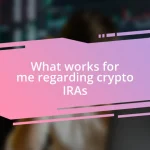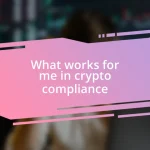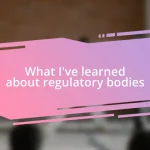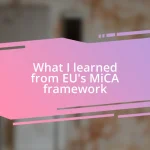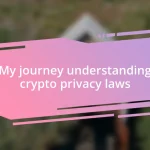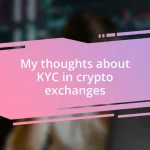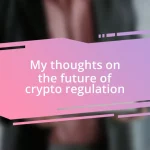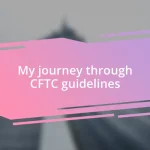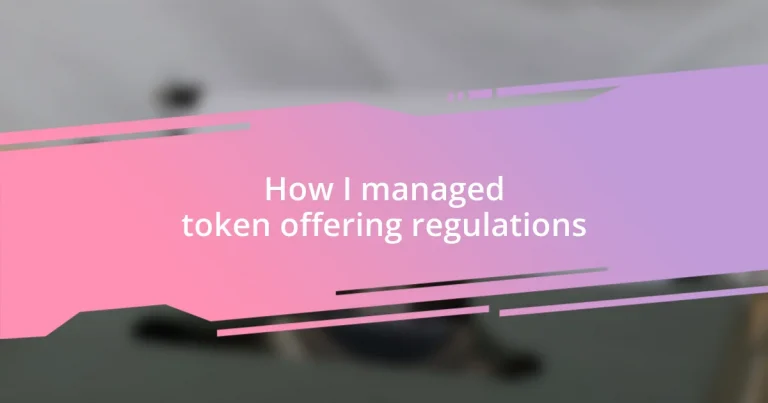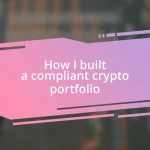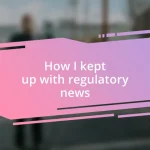Key takeaways:
- Understanding the distinction between utility and security tokens is crucial for compliance and avoiding legal pitfalls.
- Engaging with legal experts and maintaining open communication enhances clarity and project success.
- Adapting quickly to regulatory changes and focusing on transparent communication strengthens community support and credibility.
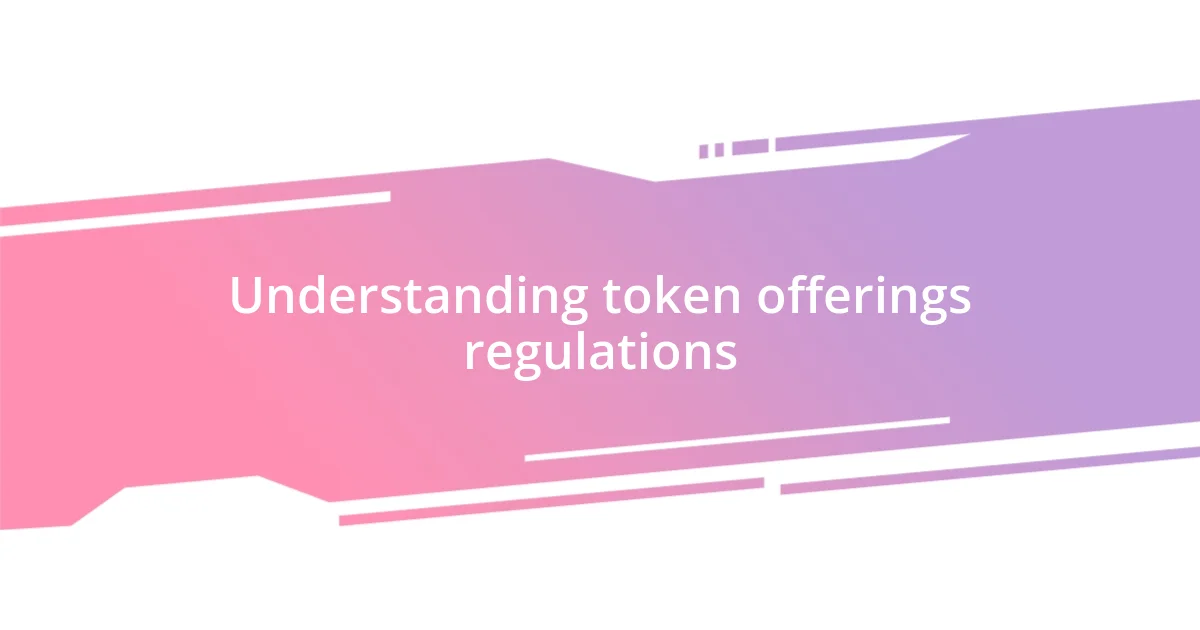
Understanding token offerings regulations
Token offering regulations can feel overwhelming, especially for those new to the space. I remember the first time I delved into these rules; it was like trying to decode a complex puzzle. It raised a question in my mind: how can something so innovative be tied down by so many legalities?
Navigating these regulations is crucial for compliance and success. I learned that understanding the difference between utility tokens and security tokens is fundamental. It made me realize that a misstep in classification could lead to significant legal trouble. Isn’t it fascinating how a simple label can change everything?
Regulatory bodies are continuously evolving their approach, which keeps everyone on their toes. For instance, I witnessed firsthand how a change in legislation affected the launch of a project I was involved with. It pushed me to stay updated and adapt quickly. Have you ever experienced a similar shift? It really emphasizes the need for continual education in this fast-paced environment.
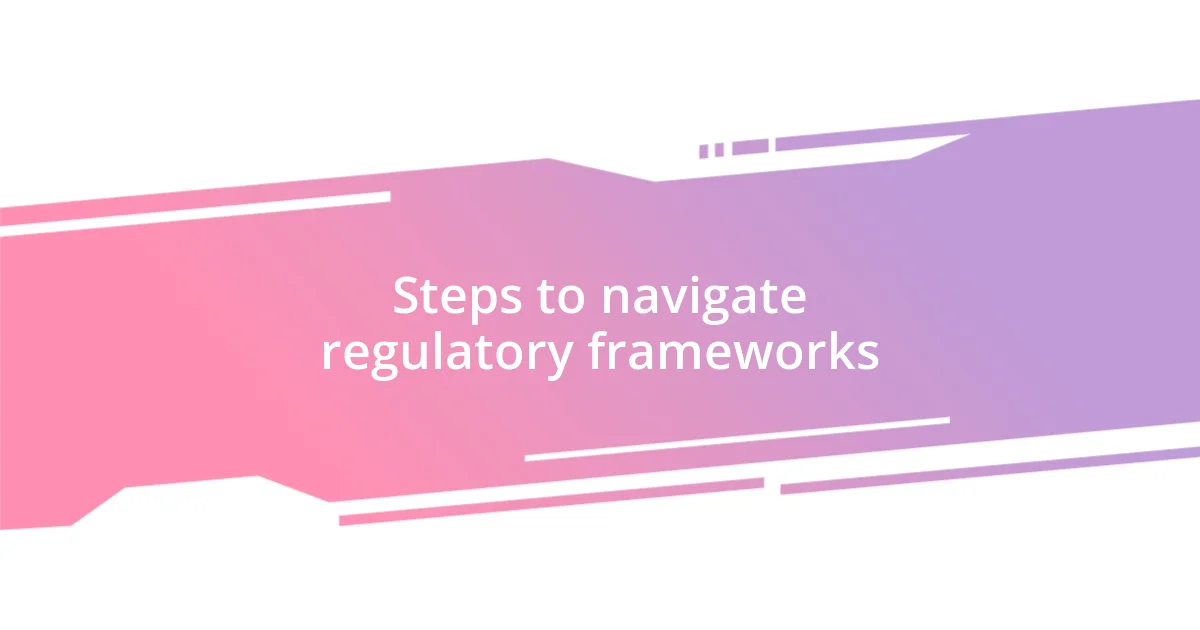
Steps to navigate regulatory frameworks
To effectively navigate regulatory frameworks, I recommend starting with comprehensive research to understand your local laws. I remember spending countless hours combing through guidelines and case studies, and although it seemed tedious, that homework paid off when my project got greenlighted by regulators. In this complex landscape, I realized that knowledge truly is power.
Next, building strong relationships with legal advisors is paramount. When I was launching a token offering, having a seasoned lawyer by my side made me feel more secure. They guided me through potential pitfalls and helped clarify the implications of different regulatory options, ensuring I was well-prepared for any inquiries. In my experience, their insights often seemed like a treasure trove of information that could save me from costly missteps.
Finally, staying agile is essential as regulations can shift unexpectedly. During a recent project, I faced a sudden change in compliance requirements that could have derailed my timeline. Instead, I quickly adapted our strategy and kept the team informed, turning what could have been a setback into an opportunity for improvement. Have you ever had to pivot on a project? I find that staying flexible allows you to respond with confidence when challenges arise.
| Step | Description |
|---|---|
| Research | Gain a deep understanding of relevant local regulations and frameworks. |
| Legal Support | Establish close ties with legal advisors for reliable guidance. |
| Agility | Be prepared to adapt to shifting regulatory landscapes quickly. |
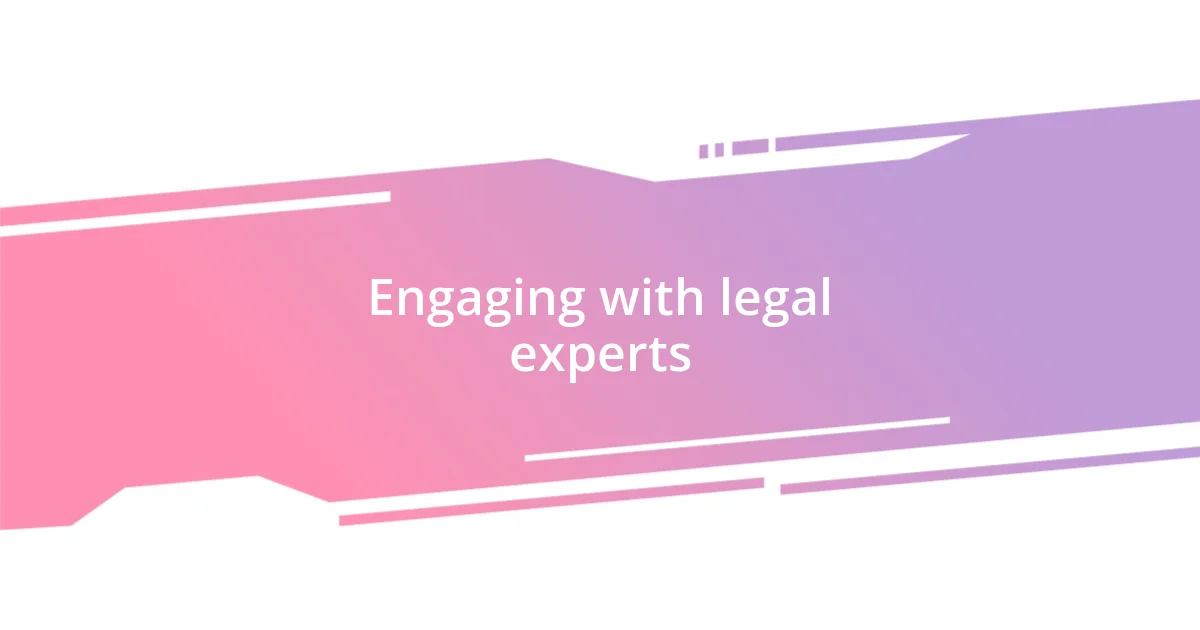
Engaging with legal experts
Engaging with legal experts transformed my approach to token offering regulations. I remember reaching out to a legal advisor during my first project, feeling overwhelmed by compliance complexities. Their detailed insights not only calmed my nerves but also opened my eyes to considerations I hadn’t even thought of. It turns out that having someone experienced in the legal maze can elevate your project’s chances of success.
Here are some key ways to engage effectively with legal experts:
- Initial Consultation: Schedule a face-to-face meeting or video call to discuss your specific needs and project details.
- Continuous Communication: Keep the lines open for questions and updates; I learned that ongoing dialogue fosters a deeper understanding.
- Ask for Examples: Request case studies or examples to better comprehend how regulations may apply to your situation.
- Clarify Expectations: Share your goals and timeline; this helps your legal advisor provide tailored advice that aligns with your objectives.
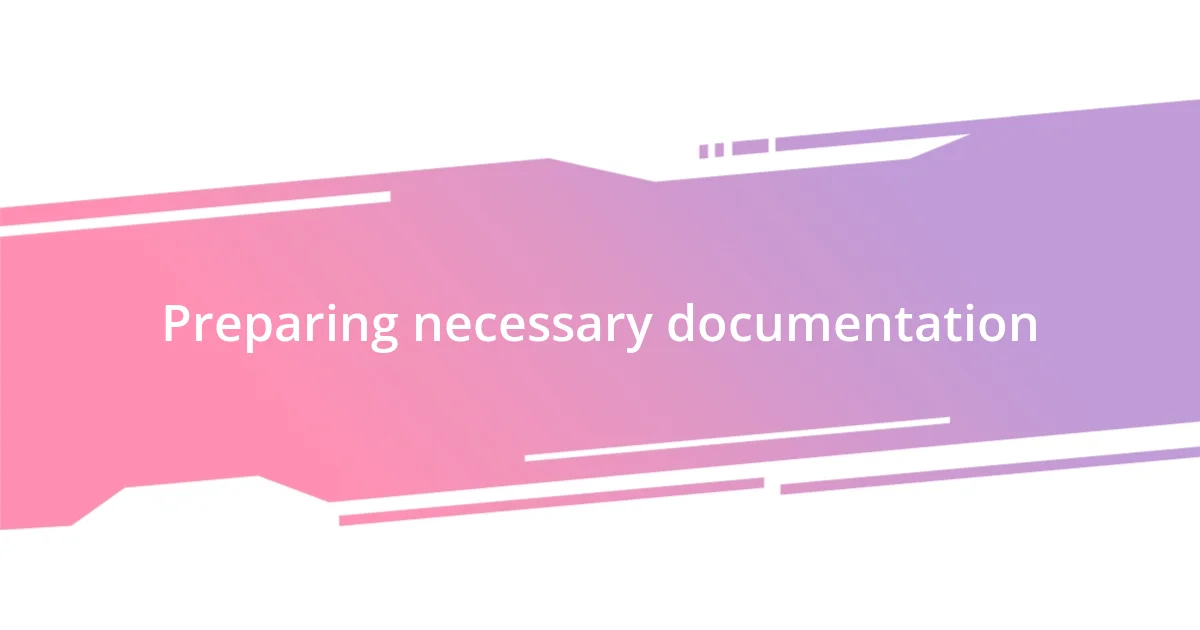
Preparing necessary documentation
Getting the documentation in order was one of the most crucial steps for me. I recall the night I sat down to draft my initial documents; the pressure was palpable. It felt like I was laying the foundation for everything that would follow. I meticulously organized contracts, compliance reports, and risk assessments, making sure each document was not just complete but also easy to digest for regulators. This preparation not only provided clarity for myself but also set a professional tone with the authorities.
During this process, I quickly learned the importance of specificity. I remember a particular instance where I submitted a financial model that was too vague. The feedback I received was enlightening—it reminded me that regulators appreciate detailed projections and clear use cases for token distribution. So, I rolled up my sleeves, refined my documentation, and included concrete figures and well-thought-out projections. It’s amazing how a little extra effort to provide clarity can ease concerns and foster trust.
One pitfall I encountered was the tendency to overlook supplementary documentation, such as marketing plans or user agreements. Initially, I thought they were secondary. However, incorporating these into my submission became a game-changer. It painted a fuller picture of my project and showcased my intent to operate transparently. Have you ever neglected details and later realized their significance? I can assure you that embracing and preparing comprehensive documentation can enhance your credibility and showcase your dedication to compliance.
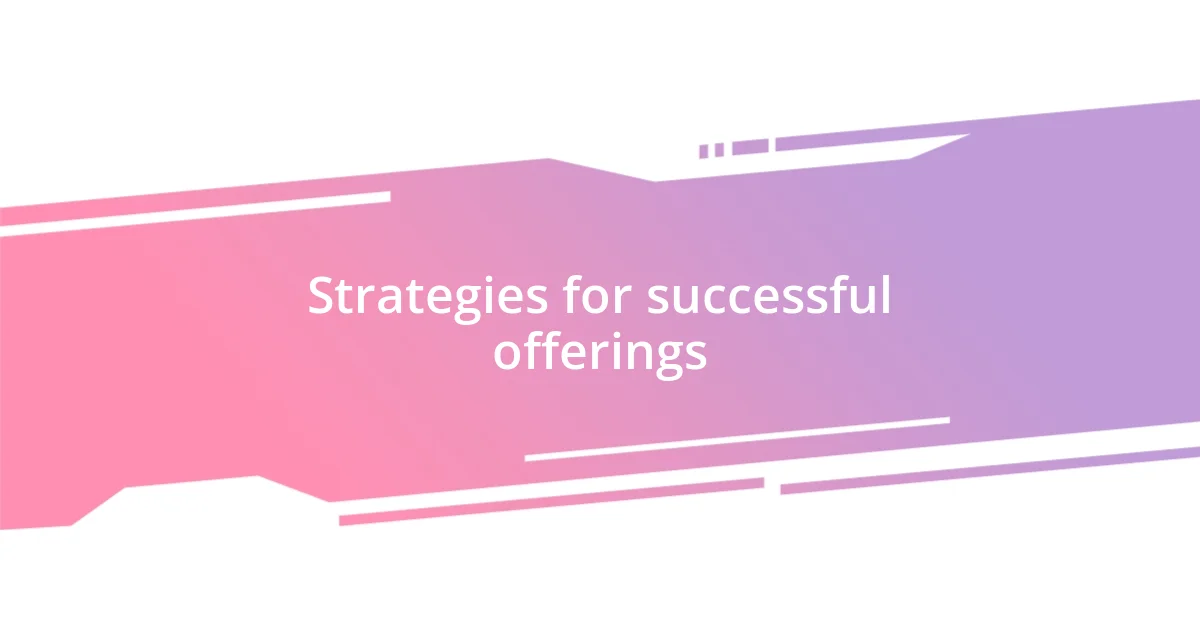
Strategies for successful offerings
One effective strategy for successful token offerings is to establish a robust marketing plan early on. I vividly recall launching my first campaign, unsure of how to convey my project’s value. By strategically targeting potential investors and communities, I learned the impact of storytelling in communication. Crafting a compelling narrative not only attracted interest but also fostered trust. Have you ever considered how a well-told story can capture attention and resonate with people? It’s an element I underestimated but soon realized its power in connecting with my audience.
Another critical aspect is to ensure transparent communication throughout the offering process. In my experience, I found that creating regular updates and engaging with the community can significantly enhance rapport. There was a moment when I faced unexpected regulatory feedback, and I hesitated to share this challenge. But when I finally did, the community responded with incredible support and valuable insights. It drove home the importance of being forthright, even when the news isn’t favorable. How often do we shy away from sharing difficulties? Fostering open dialogue not only builds credibility but also strengthens community ties.
Lastly, I cannot emphasize enough the importance of adaptability. The regulatory landscape can change swiftly, and flexibility is key to navigating these changes. There was a time when I had to pivot my approach based on new compliance guidelines, and while it was daunting initially, it turned out to be an opportunity for improvement. Have you ever faced a situation where adapting brought unexpected benefits? Embracing change can lead to innovative solutions and enhance the effectiveness of your offerings. This approach has consistently served me well, reminding me that adaptability is a crucial element of success in any venture.
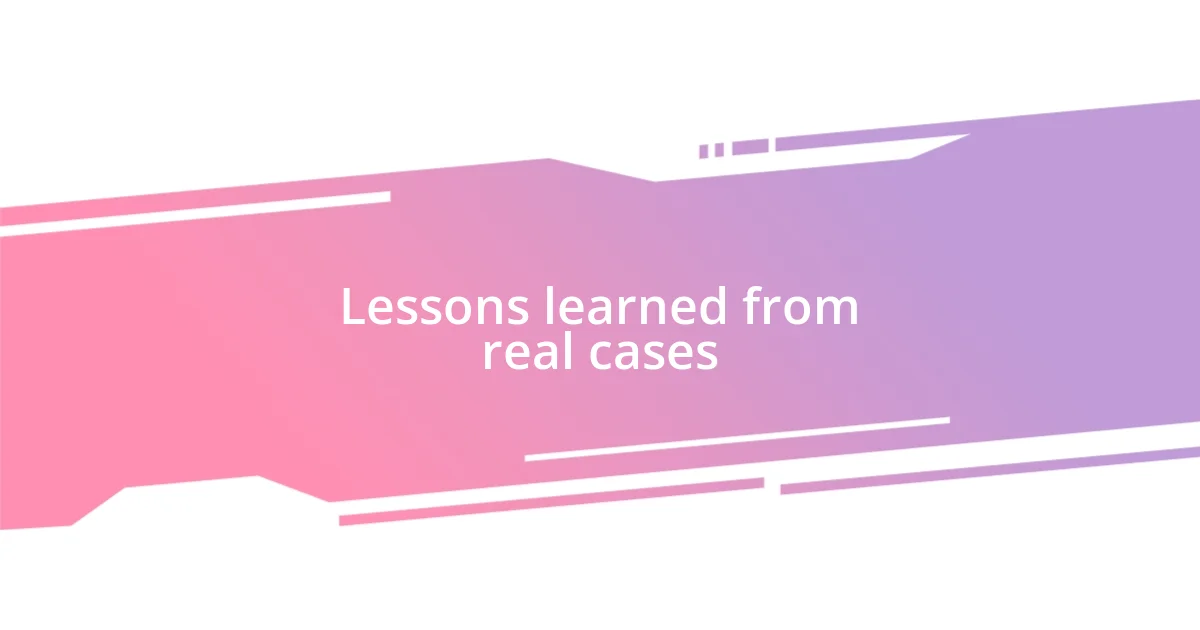
Lessons learned from real cases
Learning from real cases is vital in the intricate world of token offerings. One lesson I took to heart was how crucial it is to have a clear understanding of your target audience. During one of my early offerings, I was so focused on the technical specs of my product that I neglected to truly connect with potential investors. The feedback I received was eye-opening: investors are not just looking for figures; they want to see how your project aligns with their values. Have you ever been so buried in the details that you lost sight of who you were communicating with? Trust me, taking the time to understand your audience can transform your approach.
Another valuable insight was the necessity of robust legal frameworks. In one particular instance, I believed I had everything covered legally until a compliance officer pointed out a seemingly minor oversight. That tiny detail led to a significant delay in my offering schedule. It reminded me of the domino effect that a single misstep can have. Have you ever underestimated the importance of legal diligence? I learned that precision in legal matters can keep your project on track and protect your credibility.
I also found that building relationships with regulatory bodies can be immensely beneficial. I remember reaching out for guidance before submitting my paperwork. That conversation not only clarified my doubts but also fostered a sense of trust. Reflecting on that experience, have you ever thought about how reaching out can strengthen your position? Establishing connections with regulators can turn what often feels like an adversarial process into a collaborative relationship. It’s about building bridges, not walls.
